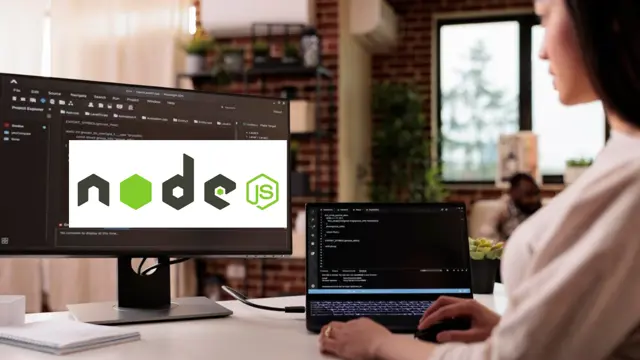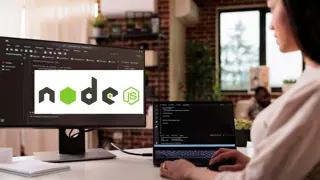- Reed courses certificate of completion - Free
- Uplatz Certificate of Completion - Free

Node.js Programming Course
Uplatz
Self-paced videos, Lifetime access, Study material, Certification prep, Technical support, Course Completion Certificate
Summary
Overview
Certificates
Reed courses certificate of completion
Digital certificate - Included
Will be downloadable when all lectures have been completed
Uplatz Certificate of Completion
Digital certificate - Included
Course Completion Certificate by Uplatz
Curriculum
Course media
Description
Node.js - Course Syllabus
I. Introduction & Foundations
- Getting Started with Node.js
- Installing and Running Node.js
- Hello World in the REPL
- Hello World command line
- Hello World HTTP server
- Hello World basic routing
- Hello World with Express
- Debugging Your NodeJS Application
- Deploying your application online
- Core Modules
- The global object
- TLS Socket: server and client
- How to get a basic HTTPS web server up and running!
- File System
- The FS Module
- Reading Files
- Reading Directories
- Streams
II. Node.js Ecosystem & Development
- Npm (Node Package Manager)
- Setting up a package configuration
- Installing packages
- Uninstalling packages
- Listing currently installed packages
- Removing extraneous packages
- Running scripts
- Basic semantic versioning
- Publishing a package
- CommonJS Modules
- Directories as Modules
- npm Packages
- Managing Dependencies
- npm scripts
- Node.js Event Loop & Asynchronous Programming
- The Node.js process
- Asynchronous Javascript
- Asynchronous Control Flow with Callbacks
- Promises
- Async/Await
- The EventEmitter API
- Third-Party Async packages
III. Building Web Applications & APIs
- Building Servers & HTTP
- Creating servers with HTTP
- The Http server class
- Parsing requests
- HTTP streaming
- Building APIs using modules, events and packages
- ExpressJS Framework
- Introduction to ExpressJS
- Routing
- Responding
- Configuration
- Views
- Middlewares
- Receiving Data
- Error Handling
- RESTful APIs
- REST
- Authentication
- Stateful vs. Stateless Authentication
- OAuth2
- Passport
- JWT – JSON Web Tokens
- Working With Data
IV. Deployment & Best Practices
- Hosting & Deployment
- Why do we need hosts
- Forever
- PM2
- Node on Windows
- Node as a Windows Service
- IISNode
- Hosting Complex Node Architectures with Docker
- What is Docker
- Docker CLI
- Docker File system & Volumes
- Docker Files
- Containers Communication
- Docker Compose
- Best Practices
- NPM Best Practices
- Node.js API design
- Error Handling
- Debugging
Who is this course for?
- Frontend developers looking to expand into full-stack development with Node.js
- Beginners in backend web development who want to learn server-side JavaScript
- JavaScript developers who want to work on backend services, APIs, and servers
- Software developers aiming to build web applications using Node.js and Express
- Developers transitioning from other backend languages (like PHP, Python, or Ruby) to Node.js
- Programmers who want to understand how to create and deploy RESTful APIs
- Full-stack developers who need a deeper understanding of the Node.js ecosystem
- Developers learning to work with file systems, streams, and core Node.js modules
- Application developers who need to manage asynchronous code using callbacks, promises, and async/await
- Engineers working on authentication systems using JWT, OAuth2, and Passport
- Professionals involved in API development, microservices, or scalable server-side applications
- Developers seeking experience with deployment tools like PM2, Docker, and process managers
- IT professionals responsible for deploying and managing Node.js applications in production
- Teams using Docker and wanting to integrate Node.js into containerized environments
- Programmers interested in learning best practices for debugging, error handling, and API design
- Students studying web development, backend systems, or JavaScript frameworksCoding boo
- tcamp participants learning full-stack development
- Freelancers and independent developers building backend services or SaaS platforms
- Career changers entering software development with a focus on backend technologies
- Technical trainers or educators creating material on modern web backend development
Requirements
Passion to learn and succeed!
Career path
- Node.js Programmer
- JavaScript Developer
- Software Developer
- IT Programmer
- Full Stack Web Developer
- Front End Web Developer
- Data and Apps Engineer
Questions and answers
Currently there are no Q&As for this course. Be the first to ask a question.
Reviews
Currently there are no reviews for this course. Be the first to leave a review.
Legal information
This course is advertised on Reed.co.uk by the Course Provider, whose terms and conditions apply. Purchases are made directly from the Course Provider, and as such, content and materials are supplied by the Course Provider directly. Reed is acting as agent and not reseller in relation to this course. Reed's only responsibility is to facilitate your payment for the course. It is your responsibility to review and agree to the Course Provider's terms and conditions and satisfy yourself as to the suitability of the course you intend to purchase. Reed will not have any responsibility for the content of the course and/or associated materials.
FAQs
Interest free credit agreements provided by Zopa Bank Limited trading as DivideBuy are not regulated by the Financial Conduct Authority and do not fall under the jurisdiction of the Financial Ombudsman Service. Zopa Bank Limited trading as DivideBuy is authorised by the Prudential Regulation Authority and regulated by the Financial Conduct Authority and the Prudential Regulation Authority, and entered on the Financial Services Register (800542). Zopa Bank Limited (10627575) is incorporated in England & Wales and has its registered office at: 1st Floor, Cottons Centre, Tooley Street, London, SE1 2QG. VAT Number 281765280. DivideBuy's trading address is First Floor, Brunswick Court, Brunswick Street, Newcastle-under-Lyme, ST5 1HH. © Zopa Bank Limited 2026. All rights reserved.

